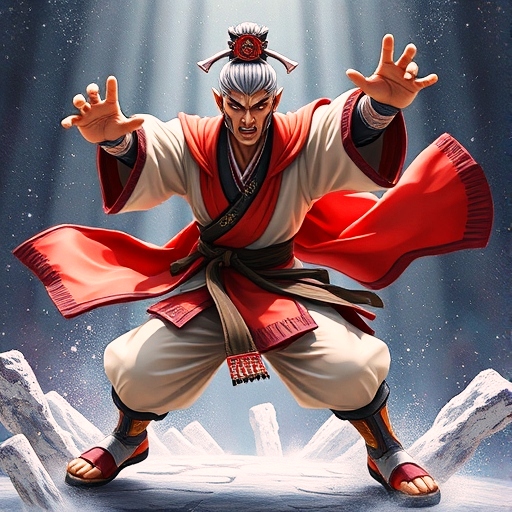
Squid Game series has taken the world by storm, captivating audiences with its intense storytelling and striking visuals. The series, which premiered on Netflix in September 2021, combines elements of survival drama with a unique twist on children’s games, exploring themes of desperation, morality, and the human condition.
In this article, we explore the complex relationship between children’s play and traditional arts depicted in Squid Game and how these elements contribute to the overarching themes and cultural significance of the series.
Squid Game Premise
Squid Game follows a group of 456 people who are all deeply in debt and desperately searching for a way out. They are invited to take part in a series of children’s games that promise a life-changing cash prize to the winner. Problems abound, however: whoever loses a game is permanently eliminated. The series cleverly juxtaposes the innocence of childhood play with the cruel reality of adult life, creating a stark contrast that resonates with viewers.
The Squid Game: A reflection of society
The games featured in “The Squid Game” were not chosen at random. These are traditional children’s games that many viewers will know from their own childhood. Examples of notable games include:
Red Light, Green Light:
A classic game in which players must stand when the light is “red” and move when the light is “green.” In the series, this game takes a dark turn as players who move during a “red light” are shot.
Tug of War:
A test of strength and teamwork, this game turns into a fight to the death that emphasizes the importance of strategy and cooperation.
Marbles:
A game of chance and skill where players must outwit their opponents to win the marbles. This game focuses on the emotional and psychological aspects of competition.
Squid Game:
A game of this title combines elements of capture and strategy, acting as a metaphor for overarching competition and the fight for survival.
These games act as nostalgic reminders of childhood innocence, but are twisted into a dark commentary on how far people will go to escape dire situations.

Cultural Importance of Children’s Games
Children’s games often reflect societal values and norms. They teach kids rules, teamwork, and competition. In “Squid Game”, the use of these games reinforces the idea that even the most innocuous activities can be corrupted by desperation and greed. The characters’ participation in these games reveals their vulnerabilities and the societal pressures that drive them to risk everything for a chance at a better life.

Traditional Arts: A Cultural Lens
Aesthetics of Squid Game
Squid Game is not only a narrative series, but also a visual feast that incorporates elements of traditional Korean arts and culture. The show’s production design, costumes, and cinematography are infused with symbolism that supports the storytelling.
Color Palette:
The bold colors used in the game stand in sharp contrast to the dark themes of the series. This juxtaposition reflects the innocence of childhood and the harsh realities of adult life.
Costumes:
The players wear pastel-colored jerseys, while the security guards wear eerie masks and uniforms. This visual difference emphasizes the power dynamics within the game and the loss of individuality of the participants.
Set Design:
The elaborate sets, especially the game’s playground-like environments, evoke a sense of nostalgia while creating an unsettling atmosphere. The use of traditional Korean motifs in the design adds depth to the cultural background of the series.
Squid Game: Korean Traditional Arts and Influences
Korean traditional arts, including music, dance and visual arts, play a significant role in shaping the country’s cultural landscape. “Squid Game” subtly integrates these elements, enriching the narrative and providing a deeper understanding of the characters’ motivations.
Music:
The soundtrack features traditional Korean instruments and melodies, creating an emotional resonance that enhances key moments in the series. The use of music helps connect the characters’ experiences with their cultural heritage.
Storytelling:
Traditional Korean storytelling often contains a moral lesson or moral message. “The Squid Game” draws on this tradition to present a story that explores the consequences of greed, betrayal, and the human will to survive.
Visual Art:
The show’s visual style draws inspiration from traditional Korean art forms such as folk painting and calligraphy. This artistic influence adds further meaning to the series, allowing viewers to reflect on the cultural significance of the games and the conflicts of the characters.
An interface between children’s games and traditional art
Commentary on Modern Society
The Squid Game is a powerful commentary on modern society, particularly the pressures of capitalism and the efforts individuals make to succeed. A child’s game rooted in innocence becomes a metaphor for the ruthless nature of adult life. The series invites viewers to consider the influence of societal expectations on individual choices and the moral dilemmas that arise in the pursuit of wealth.
Nostalgia and Trauma
The juxtaposition of children’s play and the brutal reality of competition evokes feelings of nostalgia informed by trauma. As viewers grapple with the game’s darker meanings, they are reminded of their own childhood experiences. This emotional complexity adds depth to the characters’ journey as they come to terms with their past and deal with their present circumstances.
The Role of Community
Community and cooperation are essential elements of many traditional children’s games. The Squid Game explores the dynamics of teamwork and betrayal among the participants, highlighting the fragility of human relationships in times of crisis. The series raises questions about loyalty, trust, and the lengths individuals will go to to protect themselves in a competitive environment.
Conclusion
The Squid Game is a masterful examination of children’s play and traditional art, weaving together themes of nostalgia, trauma, and social criticism. By incorporating a well-known game into a fascinating narrative, the series invites viewers to reflect on their own experiences and the cultural significance of the game. The show’s visual and artistic elements further enrich the storytelling, creating a multi-layered experience that resonates with audiences around the world.
As we continue to explore The Squid Game, we are reminded of the complexity of human nature and how societal pressures influence our decisions. The series invites us to examine our own values and how hard we strive to achieve success, ultimately leaving a lasting impression on our understanding of childhood, culture, and the human experience.
Read more about Squid Game here https://www.forbes.com/sites/monicamercuri/2024/12/29/when-is-squid-game-season-3-coming-out-everything-to-know-so-far/
Read more about traditional arts here https://handes.net/karagouna-the-famous-folk-and-popular-dress-in-greece/


